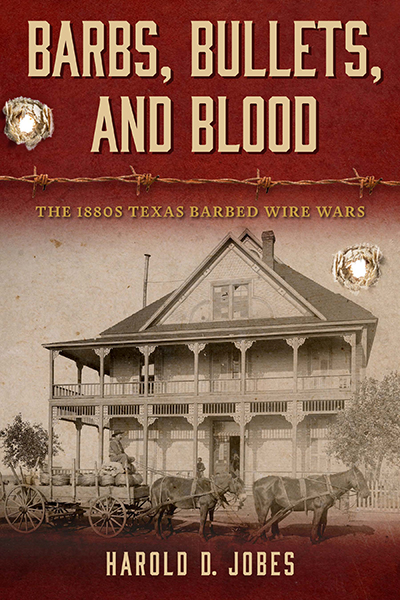
June, 2025
Published
448
Pages
50 b&w illus. Notes. Bib. Index.
Features
About Jobes's Barbs, Bullets, and Blood
In 1874 Joseph Glidden patented and manufactured the nation’s first barbed wire, and the next year Henry Sanborn came to Texas selling Glidden’s wire to cattlemen. Sales increased each year, and in 1883 Sanborn sold Texas ranchers one million dollars’ worth of barbed wire, but free-range cattle advocates and homesteaders revolted against the barbed wire fences; more than half of Texas’s counties experienced fence cutting. In the eyes of some Texans, barbed-wire fences stopped cattle drives, interfered with homesteading, and wrecked the state’s economy, but the act of fence cutting precipitated extreme levels of violence between the ranchers and the fence cutters. Fence cutting occurred as far north as Montana, but no state suffered the magnitude of fence cutting and violence as in Texas.
Fence cutting usually occurred at night and responsibility for stopping it fell on local lawmen, who often failed. The Texas state government lacked statutory authority and financial means to stop it, so Governor John Ireland called the Texas legislature to Austin for a special session to write new laws and appropriate funds to cope with this revolution. After successful passage, Pinkerton and Ferrell’s commercial detectives and the Texas Rangers stepped in to assist. A war of barbs, bullets, and blood followed. Soon detectives fled the state, a Ranger was assassinated, and another Ranger wounded. In a midnight shootout with Rangers, two fence cutters were killed, one of them the neighboring community’s justice of the peace.
Texas’s fence-cutting incidents are found scattered in earlier writings, but Barbs, Bullets, and Blood is the first comprehensive coverage of one of the state’s most violent and costly episodes.
About the Author
HAROLD D. JOBES, a sixth-generation Texan, grew up on a ranch in Kimble County and graduated from Southwest Texas State College. After serving in the US Army, he entered Texas state government, from which he retired as a government executive and returned to ranching. Jobes is a longstanding member of the Texas State Historical Association, the Wild West History Association, the Antique Barbed Wire Collectors Association, and the West Texas Historical Association, as well as being a past president of the Edwards Plateau Historical Association. He has published in the Wild West History Association’s Journal and has many papers in the Edwards Plateau Historical Association’s publication, the Edwards Plateau Historian.
Buy Now
Barbs, Bullets, and Blood: The 1880s Texas Barbed Wire Wars
448 pp. 50 b&w illus. Notes. Bib. Index.